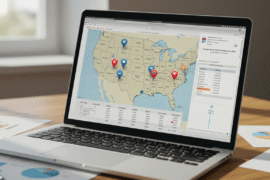This article may contain references to products or services from one or more of our advertisers or partners. We may receive compensation when you click on links to those products or services. Nonetheless, our opinions are our own.
The information presented in this article is accurate to the best of our knowledge at the time of publication. However, information is subject to change, and no guarantees are made about the continued accuracy or completeness of this content after its publication date.
- Managing 1099 Taxes as an Upwork Freelancer
- How 1099 Taxes Work for Freelancers
- Upwork 1099 vs W-2 Employment Taxes
- Importance of 1099 Tax Obligations
- Preparing for Tax Filing
- Key Documents and Records
- Calculating Taxes and Deductions
- Managing Taxes Throughout the Year
- Conclusion
- Frequently Asked Questions
- Recommended Reads
Managing 1099 Taxes as an Upwork Freelancer
Freelancing on Upwork offers independence, but it also requires managing taxes without automatic withholding. Unlike traditional employment, freelancers must handle self-employment taxes and report all earnings to the IRS. Staying organized and understanding tax obligations is key to avoiding penalties and reducing stress during tax season.
How 1099 Taxes Work for Freelancers
Freelancers are considered self-employed, meaning they pay both self-employment taxes (covering Social Security and Medicare, totaling 15.3% of net earnings) and income taxes on taxable income. Upwork acts as a payment platform and does not issue 1099-NEC forms directly. You may receive a 1099-K if earnings exceed $20,000 with 200 transactions. Regardless of forms received, all income must be reported to the IRS.
Upwork 1099 vs W-2 Employment Taxes
| Feature | Upwork 1099 Freelancer | W-2 Employee |
|---|---|---|
| Tax Withholding | No automatic withholding | Employer withholds federal, state, Social Security, and Medicare taxes |
| Self-Employment Tax | 15.3% (Social Security + Medicare) | Covered by employer contributions; employee pays 7.65% |
| Income Reporting | Freelancer reports all income | Employer reports wages on W-2 |
| Deductions | Home office, business expenses, mileage | Limited itemized deductions; mostly standard deduction |
| Estimated Tax Payments | Required quarterly | Not required, taxes withheld automatically |
| Forms Received | 1099-K (if thresholds met) or 1099-NEC from clients | W-2 from employer |
This table highlights the differences in tax responsibilities. Freelancers bear the full burden of taxes and must track expenses, while employees have taxes automatically deducted and less opportunity for business-related deductions.
Importance of 1099 Tax Obligations
Freelancers benefit from knowing their tax responsibilities for three main reasons:
- Compliance: Proper reporting avoids fines and penalties.
- Financial Planning: Estimated quarterly payments allow better budgeting.
- Tax Savings: Maximizing deductions can significantly reduce liabilities.
Voted "Best Overall Budgeting App" by Forbes and WSJ
Monarch Money helps you budget, track spending, set goals, and plan your financial future—all in one app.
Get 50% OFF your first year with code MONARCHVIP
Preparing for Tax Filing
Organization is essential. Maintain detailed records of income and expenses throughout the year, and gather necessary documents like transaction histories, receipts, and any 1099 forms. Setting up a dedicated workspace with physical or digital tools ensures efficient tax preparation.
Key Documents and Records
To file taxes accurately, prepare:
- Income Records: Upwork CSV files, bank statements, and PayPal records.
- Expense Records: Receipts for business costs such as software, office supplies, and internet bills.
- Tax Forms: 1099-K or 1099-NEC if applicable.
Organize these records to simplify reporting and ensure all deductions are captured.
Calculating Taxes and Deductions
Organizing Financial Records
Categorize income and expenses for clarity. Accounting software or folders can help track categories like marketing, software, or equipment costs.
Determining Tax Obligations
Subtract deductible expenses from total earnings to calculate taxable income. Apply the 15.3% self-employment tax to net earnings and include federal and state income taxes based on your tax bracket.
Example Calculation
| Description | Amount |
|---|---|
| Upwork Earnings | $50,000 |
| Other Freelance Income | $5,000 |
| Total Income | $55,000 |
| Business Expenses | $10,000 |
| Home Office Deduction | $2,000 |
| Taxable Income | $43,000 |
Maximizing Deductions
Common deductible expenses include:
- Home Office Deduction: Portion of rent, utilities, and insurance used for work.
- Business Expenses: Internet, software subscriptions, phone bills, and marketing costs.
- Mileage Deduction: Track business-related travel using IRS mileage rates.
Report these deductions on Schedule C of Form 1040 to reduce taxable income.
Managing Taxes Throughout the Year
Estimated quarterly payments using IRS Form 1040-ES prevent underpayment penalties. Record-keeping tools like QuickBooks Self-Employed or TurboTax simplify tracking income, expenses, and tax calculations, ensuring a smoother year-round tax process.
Conclusion
Freelancers on Upwork must take proactive steps to manage taxes. By keeping accurate records, understanding deductions, and making estimated payments, you can reduce your tax burden and avoid surprises. Using digital tools or consulting a tax professional enhances accuracy and efficiency, allowing freelancers to focus on growing their business while remaining compliant with IRS requirements.
Frequently Asked Questions
What is a 1099 tax form, and how does it apply to Upwork freelancers?
A 1099 reports non-traditional income. Freelancers may receive a 1099-K if earnings exceed $20,000 with 200 transactions or a 1099-NEC if paid directly by clients over $600.
Do I need to file taxes if I earned less than $400 on Upwork?
Yes, all income must be reported. Net earnings under $400 may not require self-employment tax, but reporting is still mandatory.
What deductions can Upwork freelancers claim?
Freelancers can deduct home office expenses, software costs, internet bills, marketing fees, and business-related travel expenses.
How can I manage tax payments throughout the year?
Make estimated quarterly payments using IRS Form 1040-ES to avoid underpayment penalties.
Are there tools to help freelancers with taxes?
Yes, QuickBooks Self-Employed and TurboTax simplify record-keeping, calculate taxes, and track expenses.

Reviewed and edited by Albert Fang.
See a typo or want to suggest an edit/revision to the content? Use the contact us form to provide feedback.
At FangWallet, we value editorial integrity and open collaboration in curating quality content for readers to enjoy. Much appreciated for the assist.
Did you like our article and find it insightful? We encourage sharing the article link with family and friends to benefit as well - better yet, sharing on social media. Thank you for the support! 🍉
Article Title: Upwork 1099 Taxes: How Freelancers Manage Self-Employment Taxes
https://fangwallet.com/2025/08/15/upwork-1099-taxes-how-freelancers-manage-self-employment-taxes/The FangWallet Promise
FangWallet is an editorially independent resource - founded on breaking down challenging financial concepts for anyone to understand since 2014. While we adhere to editorial integrity, note that this post may contain references to products from our partners.
The FangWallet promise is always to have your best interest in mind and be transparent and honest about the financial picture.
Become an Insider

Subscribe to get a free daily budget planner printable to help get your money on track!
Make passive money the right way. No spam.
Editorial Disclaimer: The editorial content on this page is not provided by any of the companies mentioned. The opinions expressed here are the author's alone.
The content of this website is for informational purposes only and does not represent investment advice, or an offer or solicitation to buy or sell any security, investment, or product. Investors are encouraged to do their own due diligence, and, if necessary, consult professional advising before making any investment decisions. Investing involves a high degree of risk, and financial losses may occur including the potential loss of principal.
Source Citation References:
+ Inspo
Internal Revenue Service. (2025, June 6). IRS reminder: The second quarter estimated tax payment deadline is June 16. https://www.irs.gov/newsroom/irs-reminder-the-second-quarter-estimated-tax-payment-deadline-is-june-16 Internal Revenue Service. (2025, May 15). IRS releases tax inflation adjustments for tax year 2025. https://www.irs.gov/newsroom/irs-releases-tax-inflation-adjustments-for-tax-year-2025












































